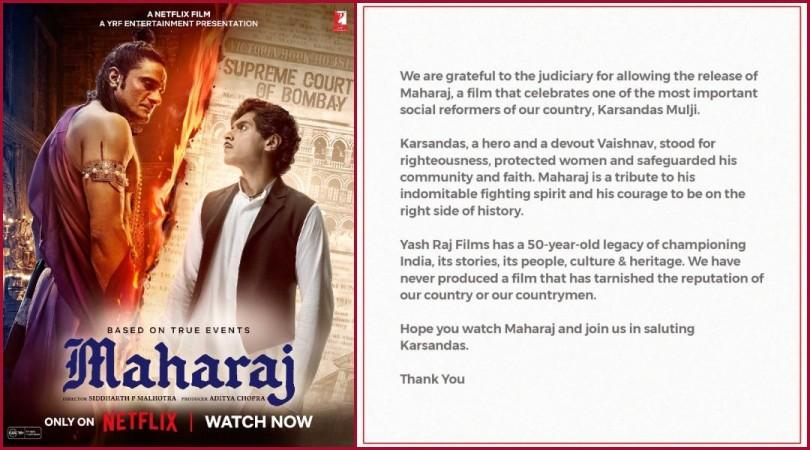
Aamir Khan's son Junaid Khan's debut film Maharaj which was supposed to be released last Friday is June 14, 2024.
Aditya Chopra has produced the film under YRF Entertainment.
A day before its release, on June 13, Netflix halted its release after the Gujarat High Court stayed its release following a petition by members of a Hindu sect who claimed the film would hurt their religious sentiments
Why was the film put on hold?
The film was delayed as the High Court had ordered an interim stay on the release as several followers of the Vaishnavite Pustimargi sect who identify themselves as devotees of Lord Krishna called it "scandalous and defamatory".
They also argued that the film is likely to incite feelings of hatred and violence against the Pustimargi sect, which would be in breach of the code of ethics under the Information Technology (Intermediary Guidelines and Digital Media Ethics Code) Rules, 2021". The 1862 libel case was heard and decided by British judges.
Who filed the case against YRF and Netflix?
The case was filed by religious leader Jadunathji against social reformer Karsandas Mulji.
Jadunathji was one of the leaders of the Pustimargi sect.
The makers of Maharaj had to deal with a legal battle in the Gujarat High Court to release their film.
‘Maharaj’ cleared by Gujarat high court. Judge said, there’s nothing objectionable in the film. So YRF and Netflix win the case. Film can stream on Netflix anytime now. It was to have been released on 14th June but a group of people from Pushtimarg sect prayed for a ban on its… pic.twitter.com/yyuHGFpzQO
— Komal Nahta (@KomalNahta) June 21, 2024
While the petitioners cited that the movie is based on the trial, deducing from the pre-release posters of the movie, Yash Raj Films argued that the movie was based on a 2013 book written by Gujarati author Saurabh Shah about the case.
Netflix and YRF argued that Maharaja claimed that the portrayal of facts of legal history can't be curtailed.
The poster for Maharaj shows a tilak-sporting, tuft-bearing man on one side, while there is a sharply dressed young man (Amir Khan’s son Junaid
— Nandini Idnani ??? (@nandiniidnani69) June 13, 2024
As always Anti-Hindu web-series and movies have been shown on Netflix in the past as well #BoycottNetflix | Ban Maharaj Film
Boycott… pic.twitter.com/ynzh91HGD3
What is the film about?
Maharaj is inspired by a real-life case and adapted from Saurabh Shah's book, 'Maharaj'. The story revolves around a social reformer who brought about significant positive societal changes.
According to a press release issued by Netflix on Wednesday, the film follows Karsandas Mulji, a journalist and social reformer, who was a pioneering advocate for women's rights and social reform.
A student at Elphinstone College in Mumbai and a protege of the scholar-leader Dadabhai Naoroji, Mulji wrote on widow remarriage, stood up for the oppressed, and sowed the seeds of societal reform.
Netflix is back with Anti Hindu content
— Gaurav ?? (@IamGMishra) June 13, 2024
Amir Khan 's son Junaid Khan starrer Maharaj movie showing Hindu sadhus & saints as miscreants & lustful#BoycottNetflix Ban Maharaj Film
Shame on @NetflixIndia @AKPPL_Official pic.twitter.com/YFWhtXgq0F
"It all came to a head in the Maharaj Libel Case of 1862, which was ignited by allegations of misconduct by a prominent figure, the case garnered widespread attention and scrutiny, setting the stage for what many consider to be one of the most significant legal battles of all time," the streamer said.
After getting a clean chit from HC, Netflix released Junaid Khan's debut film on their OTT platform.
Film critic Komal Nahta took to his X account to inform that Maharaj has been cleared by the Gujarat High Court. "Judge said, there's nothing objectionable in the film. So YRF and Netflix win the case. The film can be streamed on Netflix anytime now. It was to be released on 14th June but a group of people from Pushtimarg sect prayed for a ban on its release, saying that it would hurt religious sentiments," read his tweet.
We urge all Hindus to unite and take a stand against the recently released movie Maharaj, which deeply misrepresents and disrespects our cultural values. Please support this important cause by signing here: https://t.co/oMQj3JQFeC
— The Jaipur Dialogues (@JaipurDialogues) June 16, 2024
YRF released an official statement after the stay order on Maharaja was lifted by the honourable high court
YRF's statement read, "We are grateful to the judiciary for allowing the release of Maharaj, a film that celebrates one of the most important social reformers of our country, Karsandas Mulji. Karsandas, a hero and a devout Vaishnav stood for righteousness, protected women and safeguarded our community and faith. Maharaj is a tribute to his indomitable fighting spirit and his courage to be on the right side of history."
"Yash Raj Films has a 50-year-old legacy of championing India, its stories, its people, culture & heritage. We have never produced a film that has tarnished the reputation of our country or our countrymen. Hope you watch Maharaj and join us in saluting Karsandas", ended the statement.

















